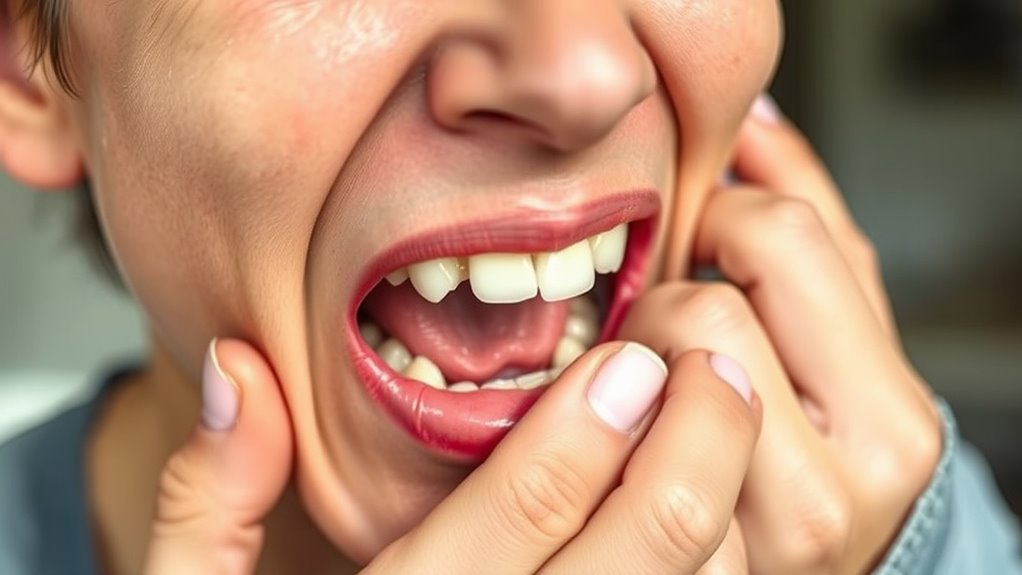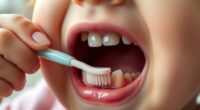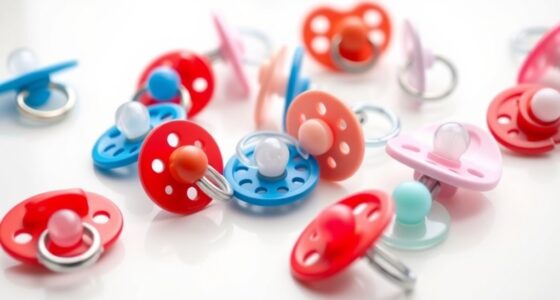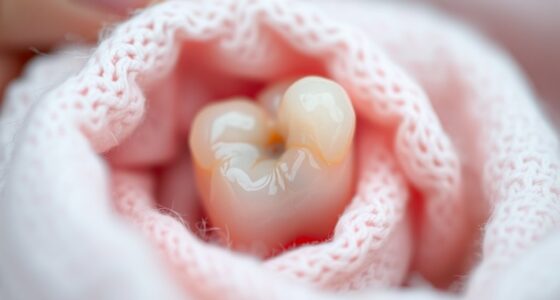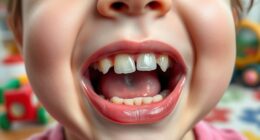If you face a dental emergency, act quickly by controlling bleeding with gauze, rinsing dislodged teeth in milk, and gently reinserting a knocked-out tooth within an hour. Use cold compresses for pain and swelling, avoid touching broken fragments, and seek urgent dental help immediately. Wearing protective gear and avoiding harmful habits can prevent future incidents. Continue exploring to discover detailed steps and tips for handling various dental emergencies effectively.
Key Takeaways
- Recognize signs of dental emergencies such as severe pain, bleeding, swelling, or knocked-out teeth.
- Control bleeding by applying firm pressure with gauze and keep the patient upright.
- Handle dislodged teeth by rinsing gently and reinsert into the socket within an hour if possible.
- Use cold compresses to reduce swelling and manage pain with over-the-counter medications.
- Seek immediate professional dental care within an hour for severe injuries or knocked-out teeth.
Recognizing When a Dental Emergency Occurs
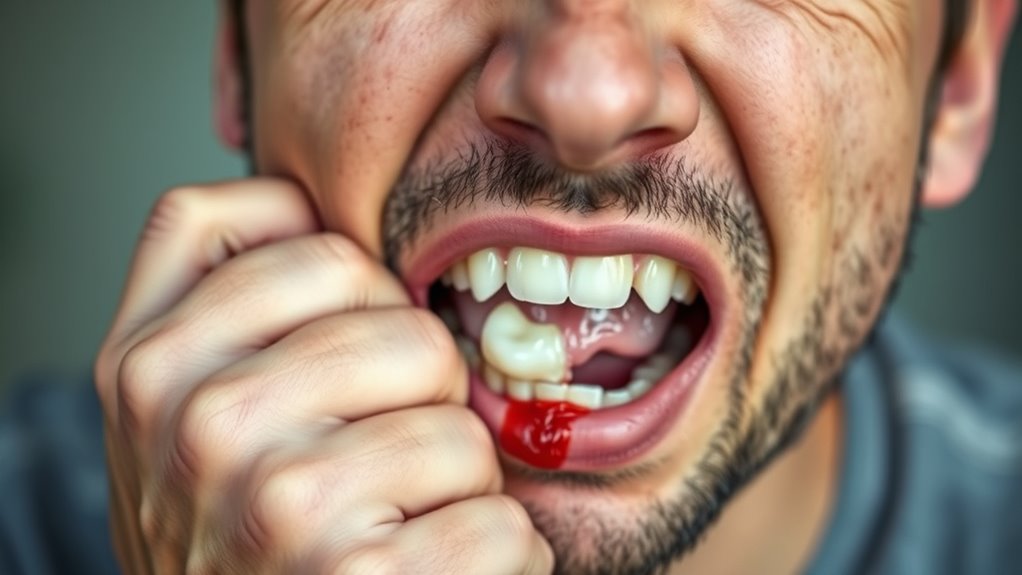
Knowing when a dental issue is an emergency can help you act quickly to prevent serious damage. You should see an urgent care provider if you experience severe tooth pain, significant bleeding, swelling, or trauma to your mouth or face.
A knocked-out tooth requires immediate attention to increase its chances of replantation. Dental trauma, such as a fracture or injury to the mouth, also signals an emergency. These signs indicate a potential threat to your oral health, requiring prompt professional care.
Not all dental problems are urgent—minor chips or sensitivities usually don’t need immediate action. However, recognizing the symptoms that point to a true dental emergency ensures you get the right treatment fast, minimizing long-term damage and discomfort.
Immediate Steps to Take During a Dental Crisis
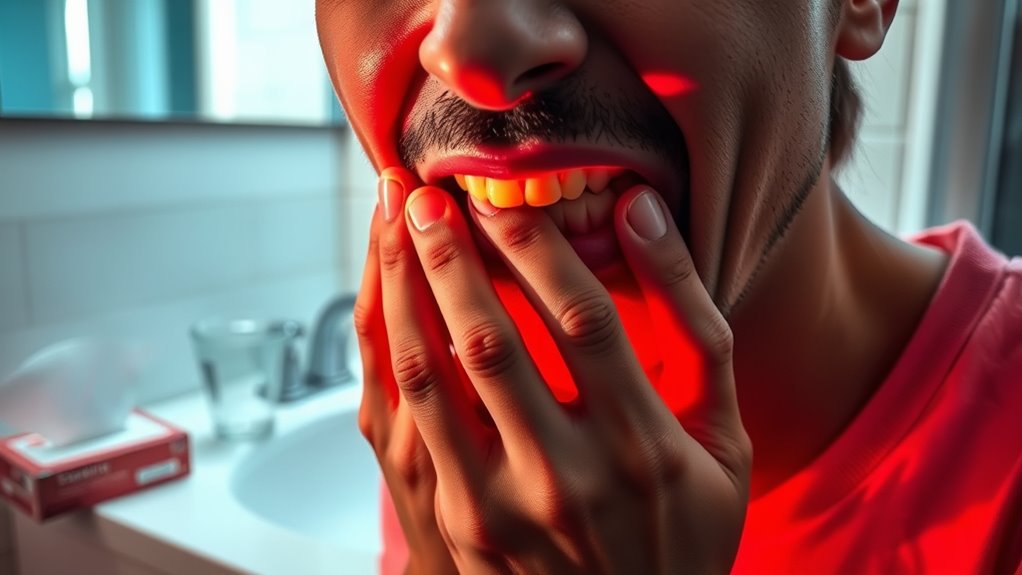
When a dental emergency occurs, your first priority is controlling bleeding by applying firm pressure with gauze. If a tooth gets knocked out, handle it carefully, rinse it, and try to reinsert it into the socket within an hour. Managing pain with over-the-counter meds and applying a cold compress can help reduce discomfort and swelling. Additionally, knowing the importance of timely action can make a significant difference in the outcome fathers’ guidance and support. Recognizing the role of contrast ratio and light control can also be crucial in assessing and managing certain dental-related issues for optimal results. Understanding the importance of proper dental care can also aid in preventing future emergencies and ensuring overall oral health. Moreover, being aware of vetted products and their safety can be beneficial when selecting items like oral gels or protective gear for children. Staying informed about angel numbers and their significance can provide emotional support during stressful situations, including dental emergencies.
Control Bleeding Effectively
During a dental emergency involving bleeding, the immediate goal is to control the flow of blood to prevent excessive blood loss and promote clotting. Start by applying firm, direct pressure with a clean gauze or cloth on the bleeding site for 15-20 minutes. If bleeding persists, place a moistened tea bag against the wound—its tannic acid helps promote clotting. Additionally, use a cold compress or ice pack on the outside of your face near the bleeding area to reduce swelling and constrict blood vessels, helping to control blood flow. Keeping yourself upright and avoid lying flat, which can increase bleeding. Proper positioning and blood clot formation are essential to stopping bleeding effectively. Using mindfulness techniques, such as controlled breathing, can help reduce stress and improve your overall comfort during a dental emergency. Maintaining awareness of first aid procedures can also support quicker recovery and reduce complications. Understanding hemostatic techniques can further enhance bleeding control in urgent situations.
Preserve Dislodged Teeth
If a tooth becomes dislodged in a dental emergency, acting quickly can make the difference between saving or losing it. Handle the dislodged tooth by grasping the crown and avoid touching the root to prevent damage. Rinse the tooth gently with milk or saline solution to keep it clean without scrubbing. Incorporating proper preservation techniques can further improve the likelihood of saving the tooth. For example, storing the tooth in a specialized preservation medium can help maintain its vitality during transport. If possible, reinsert the tooth into its socket immediately, facing the correct way, and hold it gently in place to preserve the root moist. If reinsertion isn’t feasible, store the tooth in milk, saliva, or a specialized preservation medium to prevent damage. Seek immediate dental care within an hour to maximize the chances of saving the dislodged tooth and restore it properly. Quick action is essential during a dental emergency.
Manage Pain Properly
Managing pain effectively during a dental emergency is vital to comfort and preventing further injury. To achieve pain relief, start by rinsing your mouth gently with warm water to clear debris. Using emotional support can also help you remain calm and positive during stressful situations. Applying a cold compress or ice pack to the outside of your face near the affected area for 15-20 minutes can help minimize swelling and reduce inflammation. Take over-the-counter pain relievers such as ibuprofen or acetaminophen, following the recommended dosage, to manage discomfort and alleviate dental pain. Avoid placing aspirin or other painkillers directly on the gums or teeth, as this can cause tissue burns. Being aware of credit card security measures can also help you avoid potential financial issues if your personal information is compromised during an emergency. Incorporating AI in Business solutions like automated support tools can further streamline emergency responses and provide helpful guidance during dental crises. Additionally, understanding dental emergency procedures can prepare you to act swiftly and appropriately in urgent situations.
Handling Knocked-Out or Broken Teeth Effectively
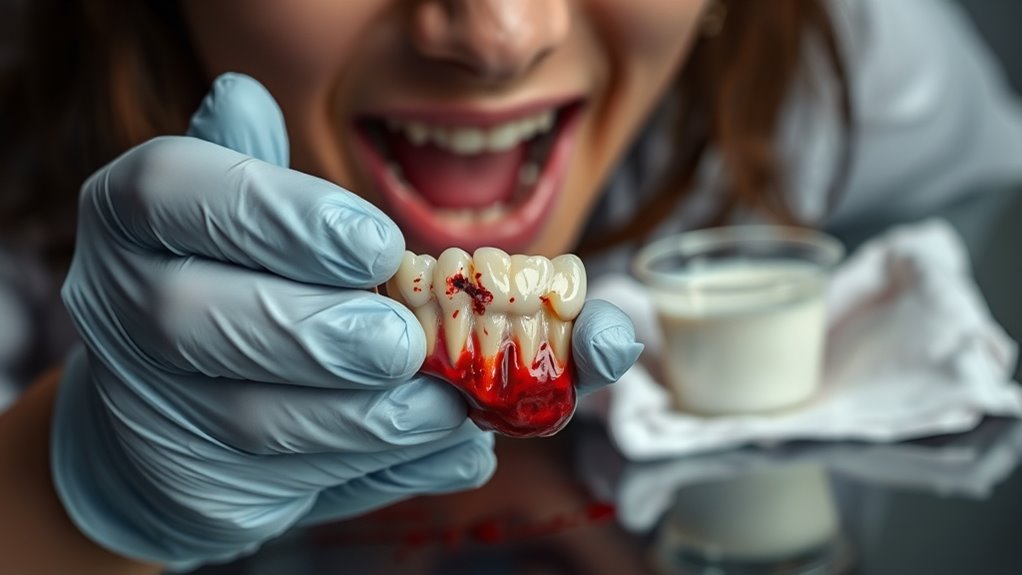
When dealing with a knocked-out tooth, handle it by the crown, avoiding touching the root, and rinse gently with saline or milk if dirty. Try to reinsert the tooth into the socket within 60 minutes to preserve the tooth and prevent infection. Using proper soundscapes and auditory cues can help calm the patient during the emergency. If reimplantation isn’t possible, store the tooth in milk, saliva, or a preservation medium, and seek an emergency dentist immediately. For broken teeth or tooth fragments, keep the pieces moist in a sealed container to increase chances of successful restoration. Acting fast minimizes dental trauma and helps prevent further damage. Additionally, understanding dental trauma management can improve outcomes and reduce the risk of complications. Prompt dental care is essential to manage the situation effectively and protect your oral health. Proper emergency response techniques can make a significant difference in saving the damaged tooth and ensuring proper healing. Familiarizing yourself with first aid protocols can further enhance your ability to respond effectively in dental emergencies.
Managing Soft Tissue Injuries and Bleeding
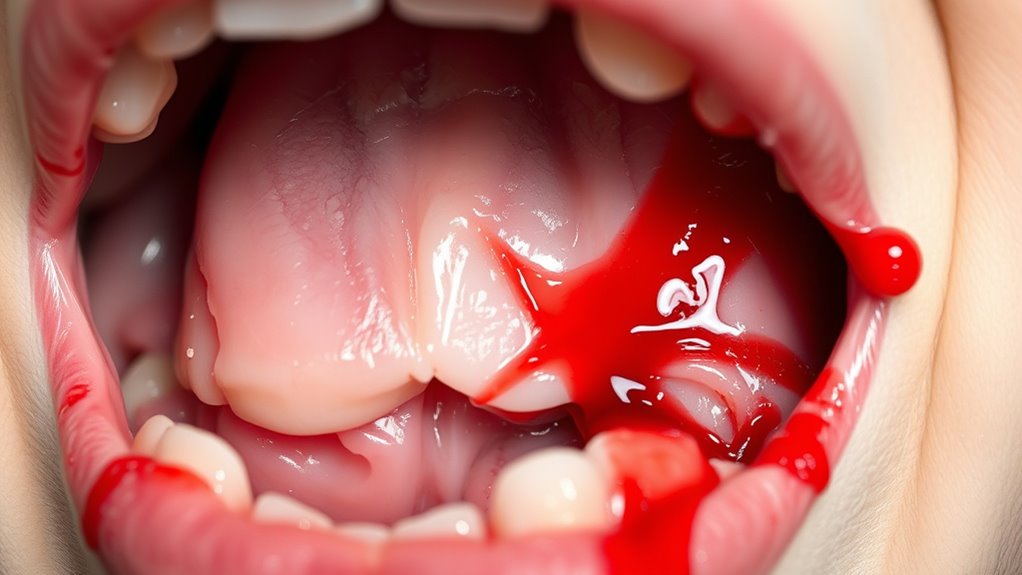
Prompted by the importance of acting quickly with knocked-out or broken teeth, addressing soft tissue injuries and bleeding requires prompt and careful intervention. To control bleeding, apply gentle pressure using clean gauze or a damp tea bag for 15-20 minutes. Rinsing your mouth with a saltwater solution (½ teaspoon salt in 8 ounces of warm water) helps reduce bacteria and promotes healing. A cold compress on the face or cheek can lessen swelling and numb pain. Avoid heat, alcohol, or hydrogen peroxide on the injury, as they can irritate tissues. If bleeding persists after applying pressure, seek emergency care immediately. Incorporating sound healing techniques, such as calming music or vibrations, can also support relaxation during the recovery process. Engaging in music therapy may help soothe discomfort and promote emotional well-being during healing. Managing soft tissue injuries with these steps supports proper healing and minimizes complications, especially when understanding wound healing processes.
When and How to Seek Emergency Dental Care
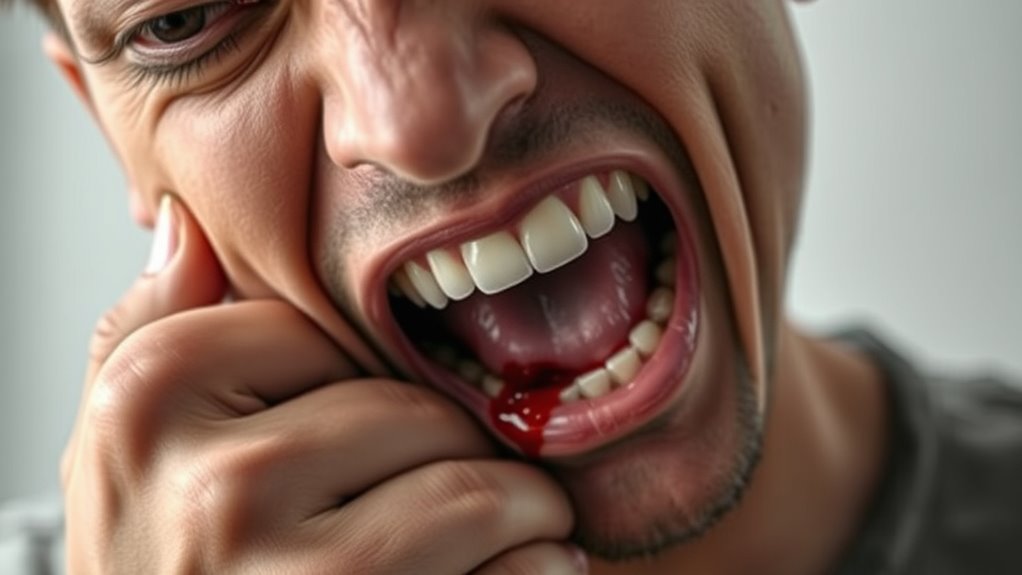
Recognizing the signs that require immediate dental attention can help prevent further damage and preserve your oral health. If you experience severe pain, uncontrolled bleeding, or a knocked-out tooth, seek urgent care within an hour to increase the chances of saving the tooth. Using appropriate emergency equipment can also make a difference in stabilizing the injury before professional help arrives. For dental trauma, control bleeding by applying gentle pressure and use a cold compress to reduce swelling. If a tooth is knocked out, carefully rinse it, attempt to reinsert it into the socket if possible, or store it properly in milk or a special medium. It is also helpful to be aware of frozen treats that can provide comfort after dental injuries. Additionally, keeping a tooth preservation kit on hand can improve outcomes in emergency situations. Being familiar with first aid techniques for dental injuries can greatly increase the chances of successful treatment. Contact your dentist right away for guidance.
Preventive Measures to Reduce Dental Injury Risks

Taking proactive steps to protect your teeth can greatly reduce the risk of injuries during everyday activities and sports. Wearing a properly fitted mouthguard is one of the most effective prevention methods, reducing dental injuries by up to 60%.
Avoid chewing on hard foods like ice, popcorn kernels, or hard candies that can cause dental fractures or chipped teeth. Using protective gear, such as face cages in high-impact sports, minimizes facial trauma and dental emergencies.
Regular dental check-ups help identify vulnerabilities before they turn into emergencies. Also, refrain from using your teeth as tools to open packages or bottles, as this can lead to chips and cracks.
Implementing preventive measures like mouthguards can significantly lower the chances of experiencing a dental emergency. These simple prevention strategies help safeguard your smile and reduce the need for emergency dental treatments.
Understanding the Role of Emergency Services and Follow-Up

Emergency services give you quick pain relief and stabilize serious injuries until you can get definitive treatment.
Following up with your dentist is vital to guarantee proper healing and prevent complications.
Staying in contact and attending scheduled appointments helps restore your dental health and function long-term.
Additionally, understanding the importance of legal finality of divorce can help you navigate post-emergency procedures and any necessary legal steps.
Immediate Professional Evaluation
When a dental emergency occurs, seeking immediate professional evaluation is crucial to stabilize injuries, manage pain, and prevent further damage. Urgent dental services provide essential injury assessment and immediate care, guaranteeing you receive pain relief and stabilization of damage. During this critical phase, the focus is on controlling bleeding, preventing infection, and addressing urgent issues like avulsed teeth or facial fractures. Remember, a follow-up appointment with a dental professional is necessary for comprehensive treatment, such as restorative procedures or root canals. Ensuring you understand the importance of emergency dental care can help you navigate urgent situations more effectively.
- Guarantee proper injury assessment to determine the extent of damage
- Receive pain relief and stabilization to ease discomfort
- Schedule follow-up care for infection prevention and long-term healing
Importance of Follow-Up Care
After receiving immediate care for a dental emergency, following up with your dentist is crucial for proper healing and long-term health. Follow-up care guarantees your injury heals correctly, helps monitor healing progress, and prevents infection or complications.
Visiting your dentist promptly allows them to assess the damage, plan necessary restorative procedures, and address any emerging issues. Adhering to post-emergency instructions and attending scheduled appointments reduces the risk of further problems or tooth loss.
Emergency treatment stabilizes the situation initially, but extensive dental follow-up is essential for full recovery. This ongoing care supports healing, ensures the success of restorative efforts, and maintains your oral health in the long run.
Prioritize your scheduled appointments and stay engaged in your recovery process.
Long-Term Dental Restoration
Long-term dental restoration relies heavily on timely emergency services and consistent follow-up care. When your restoration is broken or damaged, emergency dental services provide immediate stabilization, preventing further dental restoration damage and reducing discomfort. A temporary dental fix, like dental cement, can hold things together until a professional evaluation.
Prompt follow-up ensures proper crown repair, restoration stability, or addressing issues with dental implants. Delayed treatment can lead to increased decay, infection, or more extensive and costly procedures. Regular check-ups help monitor the condition of your restoration, ensuring its longevity.
Remember, addressing issues early with emergency dental services and follow-up care is key to maintaining your smile and avoiding long-term complications.
- Emergency dental services stabilize broken restorations quickly
- Follow-up appointments ensure proper crown repair and restoration stability
- Delayed treatment risks additional damage and costly procedures
Frequently Asked Questions
How to Deal With Dental Emergencies?
When facing a dental emergency, act quickly and stay calm. Rinse your mouth gently with warm water and apply a cold compress to reduce swelling.
If a tooth is knocked out, try to reinsert it or keep it in milk and see a dentist within an hour.
Control bleeding with gauze or a tea bag, and take over-the-counter pain relievers as needed.
Seek professional help immediately for severe injuries.
How Do You Fix Your Teeth When You Have No Money?
Imagine your teeth as a fragile garden that needs care but you’re out of resources. You can seek help at community health centers offering low-cost or free emergency services.
Dental schools provide supervised, affordable treatments. Look into charities or special clinics for low-income individuals, and consider applying for Medicaid or assistance programs.
These options act like skilled gardeners tending your teeth, helping your smile bloom again without emptying your wallet.
What to Do if Tooth Pain Is Unbearable?
If your tooth pain becomes unbearable, you should act quickly. Rinse your mouth with warm water and gently floss to remove any debris.
Take over-the-counter pain relievers like ibuprofen or acetaminophen as directed.
Apply a cold compress to your cheek for 15-minute intervals to reduce swelling.
Most importantly, seek emergency dental care immediately to get professional treatment and prevent further complications.
What Will a Dentist Do in an Emergency?
Ever wonder what a dentist does during an emergency? They’ll first assess your injury, examining the tooth and surrounding tissue.
They might reimplant a knocked-out tooth, repair chips, or prescribe antibiotics if there’s an infection. X-rays help identify hidden damage.
They’ll also temporarily restore your tooth with fillings or crowns, and plan follow-up care. Rest assured, their goal is to stabilize your smile and prevent further issues.
Conclusion
Remember, acting quickly during a dental emergency can make all the difference in saving your smile. If you believe that dental injuries happen mostly to athletes or kids, think again—research shows adults are also at risk, especially in accidents. Staying calm, knowing the right steps, and seeking prompt care can prevent long-term damage. Trust your instincts, and don’t hesitate to call for help—your dental health depends on it.
